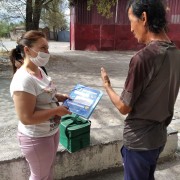Speeches Shim

The U.S. President’s Emergency Plan for AIDS Relief (PEPFAR) and the U.S. Agency for International Development (USAID) have awarded a new five-year project to combat HIV/AIDS in Tajikistan under the title, “Meeting Targets and Maintaining Epidemic Control.” The project will be implemented by the non-commercial organization Family Health International 360, in partnership with Right to Care, Palladium, Population Services International, and Gobee Group. “Meeting Targets and Maintaining Epidemic Control” is a global initiative that will provide strategic technical assistance and deliver health services directly to achieve HIV epidemic control and improve HIV case finding, prevention, treatment programming, and viral load suppression.
The U.S. Agency for International Development (USAID) announced a new five-year, $1 million, activity on Tuberculosis (TB) Prevention and Care in Prisons that will be implemented by the Republican Public Organization, Afif. In cooperation with the Main Directorate for the Execution of Criminal Sentences of the Ministry of Justice of the Republic of Tajikistan and the National Tuberculosis Program of the Ministry of Health and Social Protection of the Population of the Republic of Tajikistan, the activity will provide state-of-the-art TB treatment and care to prisoners and recently released prisoners.
Tuberculosis (TB) in prisons and dropping out of TB treatment by post-released convicts along with the spread of drug-resistant TB (DR-TB) and TB/HIV among prisoners are one of the most socio-medical problems in penal and civilian health sectors of Tajikistan.

Izatulo Saduloev is a fruit producer and exporter from the Khatlon region of Tajikistan. With USAID’s assistance, Izatulo built the first cold storage facility in Khatlon and is now a pioneer watermelon exporter to the Baltics. Within just two growing seasons, USAID helped with the formation of a cooperative and eight smallholder farmers are now exporting watermelons from Tajikistan to Lithuania.

Tajikistan is Central Asia’s poorest country and one of the most remittance-dependent countries in the world. Over 33 percent of its national gross domestic product is generated from remittances. While remittances have had a positive impact on the lives of many migrant laborers, without sufficient legal and safe ways to migrate, it increases migrants’ risk of vulnerability to modern slavery, forced labor and human trafficking.


Comment
Make a general inquiry or suggest an improvement.